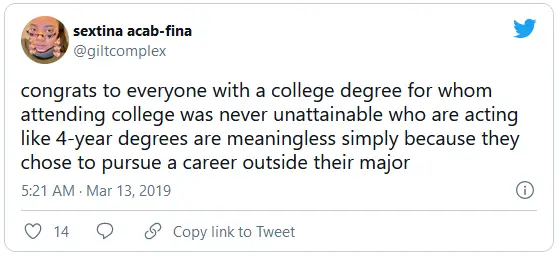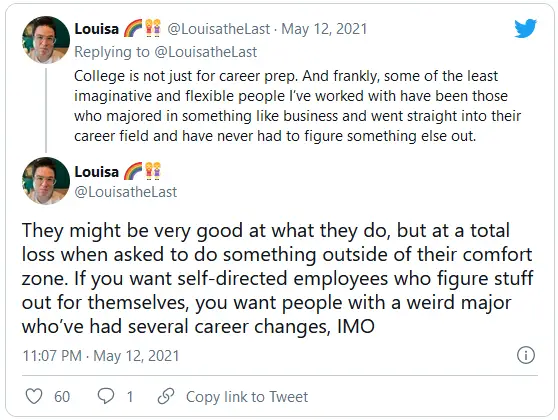The numbers seem to show many people are getting jobs unrelated to their degrees, but is that really a waste?

Are you currently working in a career that's related to what you studied in college or university?
I'm not, and there's a good chance you aren't either.
Field-of-study mismatch occurs when workers educated in a particular field work in another. In 2016, over 32% of workers across the OECD fell into this category.
Here in Israel, a 2017 study by major job board AllJobs found that 40% of workers were in jobs unrelated to their academic studies.
And according to the U.S. Bureau of Labor Statistics, in 2021 over 33% of college graduates (aged 22 to 65 with a bachelor's degree or higher) are underemployed, working jobs that don't require a college degree.
The different data align: it sure does look like there are A LOT of people not using their college degrees at their jobs.
Why does this happen? Should you be worried about wasting your degree?
I reached out to 6 job search experts for their insights. Below, I also give my take and sum things up.
1) What are the main reasons for people getting jobs unrelated to their degrees?
Alexandra Levit, bestselling author of They Don't Teach Corporate in College:
When you are 18 years old or even a little bit older than that, you make a decision based on your interests at the time. What I always tell our students and college grads is just take one intelligent step: get as many transferable skills as you can, both in university and extracurricular professional situations, and all you can ask is that you do something that is going to help you learn in as broad and general a way as possible. And then it's going to take you where it takes you. You may be involved in a job that is in your major, and you find something else within that job that interests you more.
I think it's probably, in this day and age, more typical to have a job outside your major than inside your major or even if you start with a job in your major to eventually transition into something else. That's just the way careers are now. People shouldn't worry about it at all. Yeah, it's a major, it's something that interests them, that can get them started in their secondary education. And that learning is going to be continuous throughout the life cycle. It's not like your major is the last opportunity to master certain skills. You're going to be doing all kinds of things throughout your career and a major is just the first step.
Dr. Janet Scarborough Civitelli of VocationVillage.com:
Many college majors focus on general skills such as critical thinking and communication. These skills are transferable to a wide range of careers. Also, students usually choose their majors when they are young and they might not yet be fully self-aware or knowledgeable about careers.
Biron Clark of Career Sidekick:
It's hard to predict what you'll want to do in your life, or what opportunities you'll come across when you're a student. I think it's important to be flexible and not box yourself into one field of work for life just because you chose to study it. Also, some majors simply don't lead to a specific career as clearly and directly as others.
Dawn Rasmussen of Pathfinder Writing and Career Services:
In the U.S., the Department of Labor estimates that most people entering the workforce now will have between 10-15 jobs in their lifetime.
I personally think this number is very low given the flexible, growth-centered mindset of millennials, Gen Y, Gen Z, and emerging new careerists.
The previous traditional mindset of going to school with a major then spending a lifetime doing the same type of work all the way to retirement is outdated.
Of course, there are exceptions, but nowadays, younger generations LOVE being intellectually challenged, and see their pathway to moving up or taking on new, more interesting responsibilities as a sequence of multiple jobs and even multiple careers.
Mark Anthony Dyson of The Voice of Job Seekers:
Most people don't explore different interests while they are in school. Most people know two extremes:
- They are not given specific directions. People stumble upon their interests. Their responsibilities become what they tolerate to make a living.
- Young people are given specific directions based on their parent's experience. Although they may experience success, they are unhappy because it was not what was promised or unable to adapt to their new circumstances.
Donna Svei of AvidCareerist:
The chosen career dead-ends. While not foolproof, LinkedIn Career Explorer is a good place to check on the current prospects for a prospective career path.
My take
Back in high school, I was planning to follow my grandfather and father as entrepreneurs until I fell in love with computers and decided to major in Computer Science. Without that Bachelor's of Science, I could never have started my career in 2000 as a web developer at Amazon.com because the degree was a requirement in the job description.
However, my priorities changed after my last e-commerce-related job in 2006, and I then came full circle and became an entrepreneur after all. Looking back now after having spent more years running a business than I ever did in web development, I probably would have been better served by taking a Master in Management or similar degree instead. And I still could, since it can now be done online and at my own pace, as opposed to dedicating full years of my life to it.
You can see that my story mirrors a lot of what my colleagues said above: changing interests, transferable skills, flexibility… One thing I also tell students is that there are so many different kinds of jobs and professions they can't possibly know about before entering college or university, it may not make sense or even be realistic to aim for a dream job when choosing a major.
Summary: the main reasons people end up having careers outside their major
- Interests: students choose based on what appeals to them at the time, but that will usually change
- Sunk cost: the fact that you spent so much money on a degree isn't a good reason to force yourself to stick with it, but some people do
- Not all degrees lead directly into a profession
- Path of least resistance: job search can be so hard, sometimes people will take the first jobs that come their way regardless of whether they'll use their degree
- Discovery: people learn later about new jobs they didn't know existed, or that didn't exist back when they chose a major
2) How should students choose a major?
Dr. Janet Scarborough Civitelli:
First, I don't believe it is realistic to expect people in their late teens or early twenties to choose one career and stick to it forever. Most people will change career paths at least once, if not multiple times. However, I do encourage students to take the time to assess their strengths, interests, personality, and values. By knowing themselves well, students are more likely to choose career paths that are a good fit.
Biron Clark:
Make a list of your interests and what type of topics you enjoy. Think about whether you're more creative or analytical. Research various majors and what careers they lead to. Also, think about your priorities. Do you care more about earning a high income? Do you want to work for yourself? Do you want a great work/life balance and flexibility? Different careers have different strengths and weaknesses, so it's important to look at what you value, what type of careers you'd like, and then what majors can lead to that type of career.
Also, many universities let you enter as “undeclared” and choose your major later. So this is a way to delay the decision until after you've taken some courses and seen what you enjoy. This typically does not add to the amount of time and courses needed to graduate, since every major at a four-year university should include electives.
Mark Anthony Dyson:
They need time and space to explore, and perhaps it takes time. I recommend doing dozens of information interviews throughout their college career. They can also change their minds and direction with accurate world intel from those who are experienced in their industries. This way, if they make up their minds, it will be based on understanding the journey and rigor of their focus.
Alexandra Levit:
Do something that is going to allow you as much exposure to different types of skills, cross functional skills, things like client relations, and public speaking and sales and marketing and finance. Expose yourself to as much of that in your undergraduate education as you possibly can. The flip side of that is: don't do anything that's ultra-specific even if pretty sure you love it. What you love when you're 18 might not be what you love when you're 22 and you don't want to be pigeonholed too much, because you are going to change your mind.
Dawn Rasmussen:
Careers are not about focusing a laser beam in a specific direction then staying along those precise lines to the distant retirement goal. Instead, it’s a beautiful, messy, constantly evolving universe that requires skills, interest, ability to deliver results, opportunity, and connections that will open doors for you.
I studied communications and began my career in educational television programming. That shifted when I got bored and wanted a new challenge. I then spring-boarded my writing skills into tourism, which embraced my love of travel. From there, I also did educational programs to clients interested in our destination. Then I became a hospitality / tourism state school to career director helping students track into jobs in the restaurant / hotel industries. From there, I also taught at local colleges and a university. Then I started my business… as a resume writer. I am currently a national speaker at national conferences. Then, I wrote my first educational children’s book. So, there are some common threads (writing, education, communications) through some very different career fields and widely-divergent jobs.
But now, there just is so much more choice of what to do and those opportunities are so much more easy to access with everything being online. We are already deep into this major workplace evolution and it is an exciting time.
That being said, employers do hire specialists, so the key is to keep gaining skills and growing, so when the next opportunity comes along, candidates who have been continuously adding to their subject matter expertise can pack up their skills and simply roll them into the next job or career, which will be the next professional growth spurt in their lives.
My advice to young careerists: Do what excites and motivates you. Then, when you are ready for your next challenge, look for what excites and motivates you at that new stage of your life then follow your goals. You are not going to be alone when you come to a point in your career where it may very well diverge away from your original course of study. But knowing how to shift your transferable skills towards that next area that interests you, and taking the time to keep growing before you reach that point is already becoming the norm.
Adaptability and a growth mindset are key!
Donna Svei:
I would tell them to learn how to learn and to EXPECT to change careers several times over the course of their working lives.
My take
I had a friend who wanted to be a doctor since he was 5. That dream stayed with him through high school and university, and he achieved his goal. If you have that kind of burning desire, go for it and choose the major you need (hopefully you can get in!).
For my parents' generation, upward mobility was a big deal, so many students chose majors that fed directly into high-earning professions.
I see nothing wrong with that, but I needed to enjoy and feel fulfilled by what I do, which is also what I hear from many students today.
Since work is always evolving, just like your own interests, I join my colleagues in saying you're often best served a) with a major that gives you great transferable skills and b) by becoming great at adapting. You will need to adapt during your career, and the easier it is, the more job opportunities will come your way.
Summary: how to choose a major you're more likely to stick with career-wise
- Assess your strengths, interests, personality, and values
- Assess your priorities
- Do as many information interviews as you can
- Aim for something that will teach you different types of cross-functional skills
Question of the article
Are you getting a job unrelated to your degree? Or if you're not currently using your degree in your career, how did that come about? Tell us in the comments.
What others are saying
- 7 Reasons Why I Don’t Use My College Degree
- What can students do to improve their chances of finding employment after college?
- More college grads land jobs outside their majors — and that’s a good thing, experts say
- Why is it that many peoples' college majors end up having nothing to do with their actual career?
- 10 Dumb Mistakes Students Make When Choosing A Major
- The Art of Landing Jobs Unrelated to Your College Degree
- The All-Purpose College Degree (Recruiter Kristen Fife's take)
- Contributing to Open Source Is ‘Better Than Any College Degree’
Bonus: How to Get an I.T. Job with an Unrelated College Degree – How to Work in Tech
READ NEXT: 🍭 How To Get a Sweet First Job After College or University
Subscribe to JobMob via email and follow me on Twitter for more real-world ideas on good decisions for your future career.





